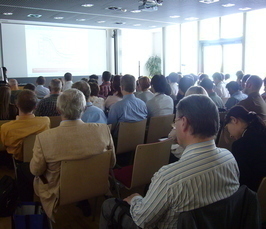POSTPONED: MPI Colloquia Series: Prof. Dr. rer. nat. Michael H. Eikerling, Institute of Energy and Climate Research, Forschungszentrum Jülich
MPI Colloquia Series: Prof. Dr. rer. nat. Michael H. Eikerling, Institute of Energy and Climate Research, Forschungszentrum Jülich
- Date: Mar 19, 2020
- Time: 04:00 PM - 05:00 PM (Local Time Germany)
- Speaker: Prof. Dr. rer. nat. Michael H. Eikerling
- Direktor, Institut für Energie und Klimaforschung , (Institute of Energy and Climate Research) IEK-13: Modellierung und Simulation von Werkstoffen in der Energietechnik (Modeling and Simulation of Energy Materials) Forschungszentrum Jülich GmbH
- Location: Max Planck Institute Magdeburg
- Room: Big Seminar Room "Prigogine"
- Contact: sek-pcp@mpi-magdeburg.mpg.de

This colloquium has been postponed. We will announce a new date as soon as possible.
The Max Planck Institute Magdeburg invites you to its series of colloquia. Top-class scientists, invited by the Max Planck Institute Magdeburg, give a survey of their research work. Everybody who is interested, is invited to attend.
Abstract
The growing demand for highly efficient and
environmentally benign energy technologies drives research on electrochemical
materials. In this realm, theory,
modeling, and simulation are contributing powerful methods and tools to study
how complex multifunctional materials come to life during
self-organization, how they live and work, and how they age and fail.
The presentation will scrutinize a hierarchy of interrelated scientific
challenges that determine cost, performance and lifetime of polymer electrolyte
fuel cells. It will provide an account of recent advances in the development of
first principles methods in electrocatalysis, the modeling and simulation of
reaction conditions at mesoscopic interfacial regions between catalyst/support
surface and ionomer skin layer, and the comprehensive modeling of complex water
phenomena that couple processes across cell components and scales. The presented
tools and analyses bolster efforts in materials selection, structural design
and testing, as well as overall performance evaluation and improvement.